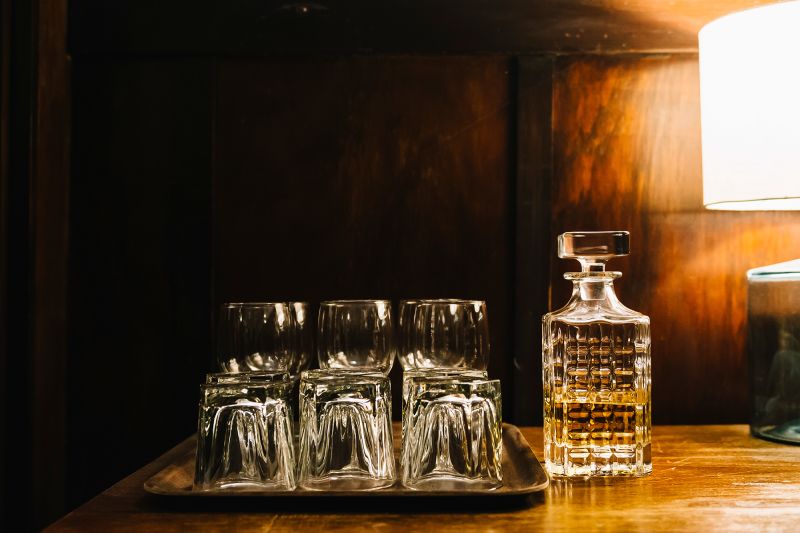Do you find yourself reaching for an alcoholic drink to unwind and drift off to sleep?
Whether it’s an old-fashioned, a hot toddy or even an espresso martini, many people have a favorite evening beverage that signals the end of a long day. But what’s the history behind this nightly ritual?
The tradition of enjoying a drink to promote better sleep — known as a nightcap — dates to the early 18th century. The term “nightcap” originally referred to a literal hat worn at night before modern heating, designed to keep the head warm for more restful sleep. Over time, people began associating this warming sensation with the effects of an evening alcoholic drink, an idea that persists in popular culture today.
However, as health officials continue to issue warnings about the dangers of alcohol, it might be time to ditch the nightly habit. In January, then-US Surgeon General Dr. Vivek Murthy issued an advisory on the cancer risks associated with alcohol consumption and called for updated health warnings on alcoholic beverages.
And the negative impact of alcohol can also extend to your sleep.
“Alcohol is a central nervous system depressant, which is why it causes drowsiness,” said Dr. Anthony Reffi, a clinical psychologist and assistant scientist at Henry Ford Health’s Sleep Disorders and Research Center in Detroit, via email. “However, it negatively impacts sleep quality, causing night-time awakenings that leave people feeling tired the next day.”
How does alcohol affect sleep?
The effects of alcohol on sleep vary and are influenced by factors such as sex, body weight, metabolism and the amount of alcohol consumed, Dr. Deirdre Conroy, clinical director of the behavioral sleep medicine program and clinical professor of psychiatry at the University of Michigan, said via email.
While a higher dose of alcohol generally makes it easier to fall asleep, it also increases the likelihood of waking up in the middle of the night, Conroy said.
Alcohol works by inhibiting excitatory neurotransmitters in the brain — the chemicals responsible for firing up functions in the body and keeping it alert — making people feel sleepy more quickly, said Dr. Timothy Roehrs, former director of research at the Sleep Disorders and Research Center of Henry Ford Health System.
Drinking alcohol before bed raises blood alcohol content, which disrupts rapid eye movement, or REM, sleep, a critical phase of the sleep cycle responsible for cognitive functions such as memory, concentration and mood regulation.
During the first three to four hours of sleep, alcohol is reaching its peak concentration in the body, which explains the initial onset of that sleepy sensation. However, in the second half of the night, people will experience a “rebound effect,” resulting in more frequent awakenings and disturbances as the night progresses and alcohol is metabolized, Reffi said.
Moderate and high doses of alcohol also reduce the overall amount of REM sleep an individual gets in a night, Reffi added.
Research also shows that people with chronic insomnia may find temporary relief from alcohol use before bed, but the effects are short-lived.
One study conducted at Henry Ford Health’s Sleep Disorders and Research Center found that participants who drank a high dose of alcohol before bed initially slept longer than those who consumed a low dose or none. However, when assessed a week later, those differences disappeared, and the high-dose drinkers were sleeping less and experiencing fewer minutes in deep sleep, Reffi said.
Beyond affecting the quality of your sleep, regular alcohol consumption before bed can have long-term consequences, such as increased tolerance to its sedative effects and a higher risk of alcohol dependence.
Additionally, combining alcohol with other medications taken at bedtime could intensify its calmative effects, potentially leading to injuries if you get out of bed during the night, Conroy said.
Exploring healthier sleep habits
If you’re hoping for more restorative sleep, it may be time to reconsider your evening routine and explore healthier alternatives to a nightly drink.
Nonalcoholic beverages have become an increasingly popular choice for those looking to unwind without the negative side effects of alcohol. Many brands now offer options that mimic the same “bite” associated with cocktails while still providing a satisfying drink to help people relax before bed, Reffi said.
Alternatively, herbal teas or choices such as a “sleepy girl mocktail” can also provide a calming effect similar to alcohol.
However, drinking too much liquid before bed can also lead to disruptions and frequent trips to the restroom in the middle of the night, so it’s best to avoid drinking too much close to bedtime. It’s also important to steer clear of caffeine for at least eight to 10 hours before sleep to avoid interfering with your body’s natural sleep cycles.
For those who consistently struggle with sleep disruptions, talking to a trained professional can help uncover any underlying issues, Conroy said, but establishing a consistent wind-down routine can help signal to your body that it’s time to rest.
She added that incorporating relaxation techniques, avoiding stimulating activities before bed and limiting naps can greatly improve sleep quality as well as exercising regularly.
“Try other activities that help promote relaxation before bed: read, meditate, journal, pray or spend time with loved ones,” Reffi said. “Avoid activities that stress you out before bed — turn off the news, get off social media and put your phone on do not disturb.”

